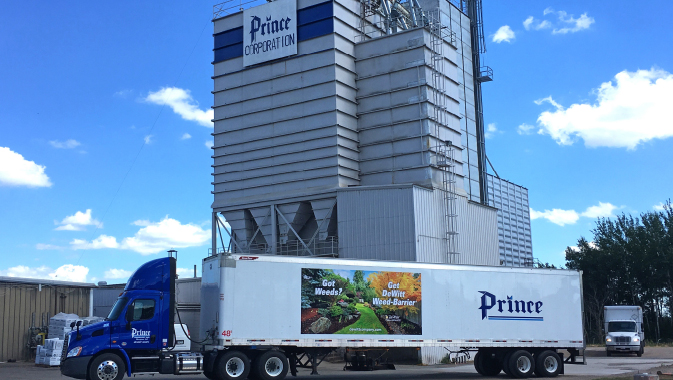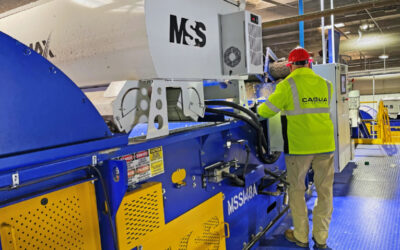The roots of Prince Corporation can be traced back to 1886 when it was established under the name Banner Mills in Marshfield, Wisconsin by the civil war veteran William H. Upham who went on to become the Governor of Wisconsin. The general store and sawmill business was taken over by H.C. Koenig in 1922 and the company was renamed Marshfield Milling. When H.C. Koenig died in 1934, his son Walter, nicknamed Prince, inherited the business and expanded its product offerings to include animal feed and agricultural supplies.
~
By 1981, the company name changed to Prince Corporation and it had become a distributor and manufacturer of animal feed, wild bird seed, grass seed, fertilizers, and tools for the garden and landscape industry. The third generation of the family ran Prince and grew its delivery area to most of Wisconsin and the Upper Peninsula of Michigan until 1997 when it was purchased by Jay Emling, John Silseth, and Dennis Wessel. Today, the company is owned by Emling, Silseth, and new President and Chief Executive Officer, Shaun Quinlan.
The new leadership has continued building the company into a full-service supplier of agricultural, wild bird, animal, and lawn and garden products and today it services much of Wisconsin, Minnesota, Iowa, Illinois, Missouri, Michigan, Indiana, Kentucky, and parts of Ohio. To support this geographic expansion, Prince added its second distribution warehouse in 1999 located in Kingsbury, Indiana and in 2013, it acquired a company based in Teutopolis, Illinois named Siemer Enterprises, where Prince now has a distribution warehouse and manufacturing facility. In total, the company has approximately 175 employees and also has a sister company located in Neillsville, Wisconsin called Prince Building Systems that supplies products to the building industry.
Throughout its rich history, Prince has recovered from four separate fires and was able to come back even stronger by using the setbacks as opportunities for upgrades and improvement. This is a company that strives to be an employer of choice and is focused on helping its vendors and customers succeed by creating a purpose-driven culture.
On the surface, it appears as though Prince’s different operating divisions are completely disparate; however, its purpose as a company ties areas like pet food together with lawn and garden care by bringing it all back to nature. “As an organization, we collaboratively developed a purpose statement so that when a warehouse worker, for example, finds himself working in the warehouse at two o’clock in the morning picking and packing a product for delivery, he understands that what he’s doing is for a higher purpose, versus simply viewing it as the transaction of pulling an item from inventory and preparing it for shipment.”
The purpose statement that Prince came up with was, ‘To supply the resources to help those that nurture nature.’ “Whether a customer is shopping in a lawn and garden establishment picking up potting soil for a plant, a farm store to get feed for their chickens, an independent retail outlet to buy birdseed for their backyard feeder, or a pet store to get food and treats for their household pet, the end result is the same – in all cases, Prince has played a role in supplying the resources to help someone – in some way, shape, or form – nurture nature; and our employees believe that is a purpose worthy of rallying around, knowing their hard work and long hours helped someone enjoy nature in one or many of its forms,” says CEO Quinlan.
Prince manufactures and distributes its own brands and products in the animal feed, grass seed, and bird seed categories. Approximately 20 percent of its annual sales are generated from products manufactured in-house and the balance of the business comes from distributing other vendors’ products within the agricultural, wild bird, pet, and lawn and garden industries.
Similarly to others in this economy, finding quality labor is a consistent challenge for Prince, particularly with the ongoing truck driver shortage. Prince distinguishes itself as an employer by taking into consideration that people want to be at home with their families as much as possible and it organizes schedules carefully to accommodate this need. Some other large trucking companies will offer good pay, but the employees are paid by the mile and will likely have to be away from home roughly three weeks out of the month. “Along with competitive wages, what we try to advertise to our potential drivers is that they’ll be home 80 to 85 percent of the time. They might have one overnight a week, so they’d be spending the majority of their time with their family, and it helps differentiate us versus the over-the-road drivers who are away from their family for extended periods,” says Quinlan.
Additionally, much like the rest of the country, the unemployment rate in the upper Midwest is the lowest it has been in over 40 years. Prince hopes that its over-arching purpose will help a potential employee decide to join the team as a result of similar values. “All other things being equal – maybe that higher purpose of supplying resources to help those that nurture nature – perhaps that resonates with a potential new hire compared to some other companies competing for their services that may not have a higher purpose, or at least one that resonates like ours may with them,” says Quinlan.
Prince’s diversity and versatility as a distributor as well as a manufacturer set it apart from competitors by giving it the ability to brand and create new products, where its competitors are generally just focused on distribution. This capacity is particularly useful when it is necessary to evolve with changing industry trends. Currently, the company’s main focus is servicing the independent retailers that are often second- or third-generation family-owned businesses, which are unfortunately slowly disappearing for many different reasons. The next generation of the family may not be interested in taking over the business, the owner may not have a succession plan, or possibly a big box store came into town and pulled away all the customers with its low prices, and the only option is to close or sell the business.
While Prince’s main focus remains servicing the independent retail stores for the foreseeable future, at some point in its future, Prince may be forced to direct its attention to other channels that it does not currently service out of support to its independent retailer customer base. “If these independent retailers become a dying breed for whatever reason, we, as a manufacturer/distributor, have the ability to pivot and manufacture a product and create a brand that we could ultimately get into other channels that we are currently not servicing as the landscape of our economy shifts. Having that versatility makes us unique, as it is not something most of our competitors could easily do,” says Quinlan.
The company’s broad and diverse product offering is a bonus for its customers, helping them save time and money. For example, an independent farm store does not have to work with five separate sales representatives or points of contact with different distributors who focus on specific lines to find quality products in various fields. It has the option to simplify this process and reach out only to Prince for all of its animal feed, wild bird seed, grass seed, agriculture, and lawn and garden product needs. Prince also has the ability to make private label products that are customized specifically for customers, which is another differentiator.
Prince Corporation actively engages with its community by getting involved with the Marshfield Area Chamber of Commerce and Industry and the company’s CEO sits on the Board. The company recently began working with the Opportunity Development Center in Marshfield, which is an organization with multiple branches in Wisconsin focused on empowering people with disabilities by providing them with opportunities to achieve their work and life goals. Prince has recruited a few individuals from the program who work approximately 20 hours a week in the warehouse and have a sponsor to go to if support is needed.
In its vision for the future, Prince is trying to identify potential new ways to invest in its community by expanding into different areas while staying true to its core business. “While we are still identifying ways to try to ‘do well by doing good’, particularly in the local communities in which we operate, we believe that that there is a lot of potential to do so with the items we manufacture and in the space in which we operate,” says Quinlan. “Bird feeding and bird watching has been linked to helping keep the mind active, which in turn can help someone suffering from dementia or Alzheimer’s stay mentally engaged and help them, ‘nurture nature’ in their own way, for instance. This is just one example of how we’re looking to partner with specific organizations while ‘staying in our lane’, so to speak, and make an impact that goes far beyond simply improving the bottom line.”
Now that hemp has been federally legalized in the United States through the passage of the 2019 Farm Bill, Prince is also looking into participating in a pilot program sponsored by the Wisconsin Department of Agriculture that is focused on growing and cultivating industrial hemp for its many uses. Hemp is a part of the cannabis family that does not contain the psychoactive THC properties but does carry other beneficial terpenes and cannibinoids. Prince is researching what benefits this plant could have for its business and what the regulations are within each state in which it operates.
“We think it [hemp] has some potential applicability within the lawn and garden industry. To start, hemp is a plant, so you have the obvious connection with other gardening resources found in a typical lawn and garden store. But also, hemp produces CBD, which many believe can help with things like chronic pain, anxiety, et cetera. We believe that this all-natural product – like a CBD oil tincture or topical cream – is a perfect fit for our lawn and garden customers to stock in their stores, and we want to help them bring it to market,” Quinlan explains. Prince is also looking at ways to potentially incorporate hemp seed into its animal feeds once the Federal Drug Administration gives its approval to do so.
Ultimately, Prince Corporation is a wholesale manufacturer and distributor that has served independent retailers since 1922 by evolving with its customers and carrying and producing consistently high-quality, diverse product lines. The company’s desire to help its customers succeed has helped it build its reputation as a reliable source in the agricultural supply, lawn and garden, animal feed, and wild bird seed industries.













